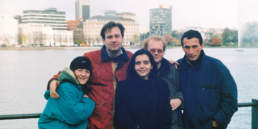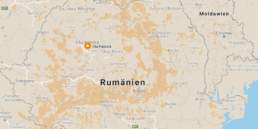Will AEGEE get a regional level? The CD is considering the re-establishment of Network regions, including the regional election of the Network Commissioners. For the two former Network Commissioners Koen Berghuis and Marijana Roščić this a very dangerous idea. “It would set up in motion some very ugly consequences that would diminish the essential characteristics of our association”, warns Koen. And Marijana says: “Regions are going to divide the locals. If the regions were good, we would have never abolished them.”
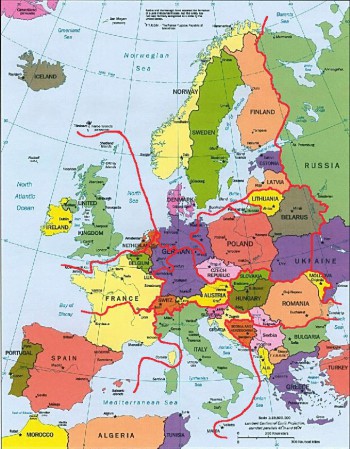
Golden Times: The CD is considering a ground-breaking reform of the Network Commission. Main element would be the creation of regions with fixed boundaries and regional elections. What do you think about the idea?
Koen Berghuis: It is a very bad idea that will have a lot of negative consequences and will ruin the unique European character of our beloved AEGEE. A regional level and certainly regional elections would only be an extra border to cross for our members to get the true European spirit. Besides, it is worrying that we apparently never learn from old mistakes. We had regions before and it didn’t work as people started to identify only with their region and not with the idea of a united Europe. If we for this and many other reasons have abolished regions, why do we even want to think about reintroducing them again?
Marijana Roščić: First of all, I want to say that I support the work of current CD, they are doing a great job so far, but this is the case where I can not support them, and this is, or is going to be, their big fall down. Just see it from a practical way – every local now has a chance to change their Netcommie if the local isn’t satisfied with the work of the responsible Netcommie. If you establish regions and regional elections and for example just one local wants to change the Netcommie: what will they do? Stay in the region and not cooperate with the Netcommie, or not cooperate with locals which support the Netcommie, which is even worse? How are they supposed to change the region?
Golden Times: Why do you oppose it so much? The CD made a survey about it and nearly two third of the locals were in favour… Shouldn’t we respect the result?
Marijana Roščić: Only 32 locals filled in the survey, 20 locals are in favour of reestablishing regions. These locals can not represent the opinion of the Network, since they are less than a minority. How can we respect it?
Koen Berghuis: I agree. Considering that we have around 200 locals, this only means that the actual support is 10 percent of our network. Besides, we have no clue how many people filled in the survey and who those people are. It is just very shallow statistics at its best. The number is way to low to base any decision on to move forward with the idea of reintroducing regions. A poll started by the Golden Times on Facebook showed us a complete different picture with the vast majority of people opposing the idea. Given the fact that I also hear far more concerns about the idea than people in favour, the CD should think twice about going on with this venture.
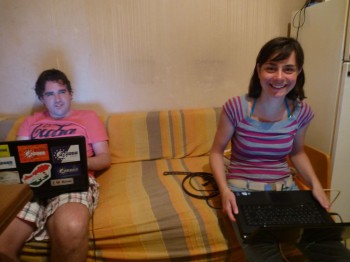 Golden Times: In case, we want to get a better picture of the network’s opinion, how could a better consultation process look like?
Golden Times: In case, we want to get a better picture of the network’s opinion, how could a better consultation process look like?
Marijana Roščić: The CD should ask all bodies to be involved in the process, not just announce it and let it to be on goodwill basis. Now we can see again the importance of Netcommies: they have tools to ask locals, share knowledge about it and help them to take active part in this process. Who knows, maybe the locals are not informed too well and they didn’t want to participate in this at all.
Koen Berghuis: First of all the CD should explain to us why they want to start this when in the past regions didn’t work out and were abolished. It is foolish to think that by trying it again you won’t have the negative consequences again. This CD has been talking about regions for already a long time, but it has never given a proper explanation why they want to reintroduce them, how it would look like and how they would tackle all the problems. Also, they should address the questions and concerns raised by oldies. When the CD did a consultation round on the mailing list of Netcom oldies, a huge majority of ex-Netcommies were against the idea and raised a lot of concerns. Again, these questions and concerns were never properly addressed, which only grows the feeling that the CD is not really interested in a true consultation round when the feedback is negative.
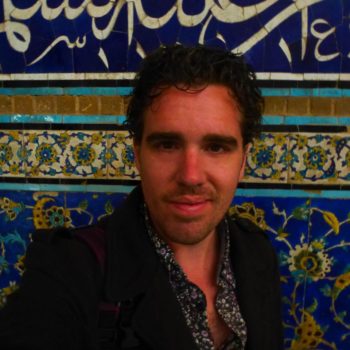
Golden Times: Currently the Network Commissioners often are in charge of random and not coherent areas, such as Romania and Greece, but not Bulgaria in between. Doesn’t that show that the current system needs improvement?
Marijana Roščić: No. The Agora should elect capable Netcommies who can take care of every local in the Network, not just in some kind of ”natural” area. It is always about how the elected Netcommie will work with and for his or her locals – and how much time and energy he or she will invest in this work. For example, when one Netcommie resigned two month before Agora Enschede, I took over the Greek-speaking locals. In that short time I established a good communication with them – by advising, helping them, giving them a database with AEGEE materials and more. But for a better cooperation, for example by organising a Network Meeting or Regional training Course, we didn’t have enough time. So it’s all about the Netcommies, Agora please vote well!
Koen Berghuis: Churchill said that “democracy is the worst form of government except all those other forms that have been tried from time to time”. Each system has its flaws, and of course also the current system has them. But that doesn’t mean you should replace the whole system by something that didn’t work in the past and will never work in the future. Besides that, the current system has the advantage that it is flexible. If the Bulgarians would gladly want the same Netcommie as their neighbouring countries, they can always ask for that. It is very easy with this system to change locals between different Netcommies – something that would become impossible with fixed regions.
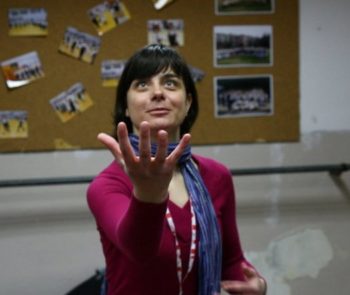
Golden Times: Wouldn’t more coherent regions, which stay together over several years, create a stronger cooperation of locals within a region? And wouldn’t that also make more competent Network Commissioners because of better knowledge transfer within a more coherent region?
Koen Berghuis: By fixing a region and creating a regional level you are only creating a regional identity that will replace our European identity that we have as AEGEE. It will actually limit cooperation as locals will only focus on the region, creating an extra hurdle to cooperate on a true European level. Besides, the best cooperations are always those that come voluntarily. You won’t suddenly get a better cooperation if two locals just happen to be in the same region with the same Netcommie. AEGEE-Ankara and AEGEE-Yerevan for example had already great cooperation during my time in the Netcom, even if they each had a different Netcommie. Cooperation is always driven by skilful people and great ideas, not by a bureaucratic structure. If we want to improve cooperation, focus on the people, focus on knowledge – don’t focus on creating a bureaucratic structure.
Marijana Roščić: I believe that if the regions were good, we would have never abolished them, but AEGEE would have improved that kind of concept until perfection. But we abolished them and made a new way of Network distribution. I agree that knowledge transfer is important, and Netcommies should involve members who are interesed in taking care of locals as Subcommissioners in their team, so they can someday be capable of being their Netcommies. With regional elections maybe locals will chose someone who is popular and not capable of doing the Network Commissioner’s tasks, but when you need to be presented to the Agora and the Agora is voting for you, I believe only members with a good competence will come to the stage, and Agora will vote for the best ones.
Golden Times: You were both in the Network Commission. Couldn’t your work have benefited from the reform idea?
Marijana Roščić: I don’t think so. Your work depends just on you and your team, on making a better cooperation between locals – by organising Network Metings, helping them in organising trainings, using common groups at Gmail, Facebook and more ways. There are so many ideas from locals and from the team, you just need to find a way to realise them.
Koen Berghuis: The reform idea would have made my work a lot worse for sure. One of my main aims as Netcommie was to promote our European values and European cooperation. A regional level would just be an extra hurdle in between the European and local level.
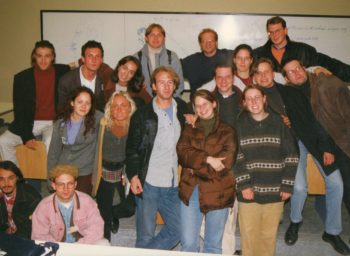
Golden Times: One of the main arguments in favour of the reform idea is to create regions with regional elections, so that the locals will get a stronger influence in matters that concerns directly them. Isn’t that a good point?
Marijana Roščić: Just in cases that regions will include locals from one country, if that even happens. When you say „matters that concerns them“ you really need to keep in mind that this cover all matters: from administrative and bureaucratic tasks and problems to cooperation with other organisations. But a big plus will be finding a solution for problems that we are always dealing with: for example lack of active members and knowledge transfer. But those are general problems in AEGEE, not just in regions, right?
Koen Berghuis: I don’t see any good point at all. If a local has some matters that concerns them, they can already in the current system address it to the Agora and make their voices heard. Locals from different areas will notice this and for sure will vote accordingly. It is this part of the whole idea that is for me the most worrying. It would mean that if having back the old Rainbow Region – Malta, Italy, Slovenia and Croatia – it would be almost impossible for a Croatian candidate to be elected as Netcommie if there is also an Italian running, as people will always opt for a person from their own country, no matter how qualified the Croatian candidate is. After having regional elections, what’s next? Voting on proposals by region? Having regional boards? It would set in motion a trend that will be impossible to stop and would forever ruin our European character.
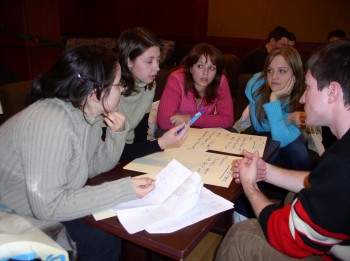
Golden Times: You said that the proposal is not good, because the fact that AEGEE knows only a local and European level is a cornerstone of AEGEE. But is such a dogma worth it, if you give up practical advantages by having strong regions?
Koen Berghuis: Definitely. The heart and blood of each organisation lives in its ideas and values, certainly not in its structure.
Marijana Roščić: Every medal has both side. On the other side I can see how regions are going to divide and make more differences between locals in total. This will ruin the European level, since locals from determined regions will vote just for „their“ candidate, who maybe not be the best for the position which they are running for.
Golden Times: Koen, you are from the Netherlands. With the Nedertop meetings you actually sort of have a national or regional level, don’t you? And Marijana, you are from Croatia, which was part of the Rainbow Region, which informally still exists. Wouldn’t formalising these regions democratise these quasi-existing regions?
Koen Berghuis: It is true about the Netherlands, and the Nedertop meetings have of course a purpose. But Dutch locals would never dream of going a step further and creating a fixed national level. So why if not a single person in AEGEE wants to give up our European ideal for a national level, does the CD think that they want to do it for a regional level? A regional level and regionalism can be as damaging as a national level and nationalism.
Marijana Roščić: The Rainbow region doesn’t exist anymore as it was in the time when I joined AEGEE, when there were locals from Italy, Malta, Slovenia and Croatia. The mailing list still exists there, but keep in mind that this is also because Italian-speaking locals and AEGEE-Valletta have been under the same Netcommie for years, they were never separated. So you are wrong when you say that we have quasi-existing regions. We have locals that have a feeling of belonging to regions because of geography or the same language or something that they consider to be common for more locals, as you can see in the Balkans. Formalising regions will just make official borders between locals, but that doesn’t mean you will satisfy all locals, maybe they will be in one region according to geographical position, but they will not share a common feeling of belonging there, because of different languages, history and similar reasons.
Golden Times: Are you concerned that the reform idea might open Pandora’s box by shifting more and more competences and decisions on a regional level in the next years?
Marijana Roščić: Not just concerned, I do truly belive that it is going to be like that.
Koen Berghuis: Absolutely, it would set up in motion some very ugly consequences that would diminish the essential characteristics of our association.
Golden Times: Is there anything you would like to add?
Koen Berghuis: I hope that the CD takes our worries seriously and will properly address them. Plus as the majority of the people in AEGEE might never have heard of regions and the history behind it, I hope they will properly study the full story behind why we abolished regions before. It would be extremely foolish to make the same mistake twice.
Marijana Roščić: Just something that I usually say: Netcommies should know their locals “in soul”, they should be Spiritus Movens for locals. A Netcommie should be better than his or her predecessor and find a successor who will work better than him or her! That will guarantee continuity and better working locals, not reestablishing regions that, without an excellent Netcommie, will not change anything except making borders in the Network. And we are dreaming about Europe without borders…
Related Posts
2nd February 2017
Learn the rules first
I was recently quoted as saying, I don't care if Instagram has more users than Twitter. If you read the article you’ll note there’s a big “if” before my not giving of said shit. Numbers are important. Number of users is important. So are lots of other things. Different services create value in different ways. Trust your gut as much (or more) than the numbers. Figure out what matters and build something good.

